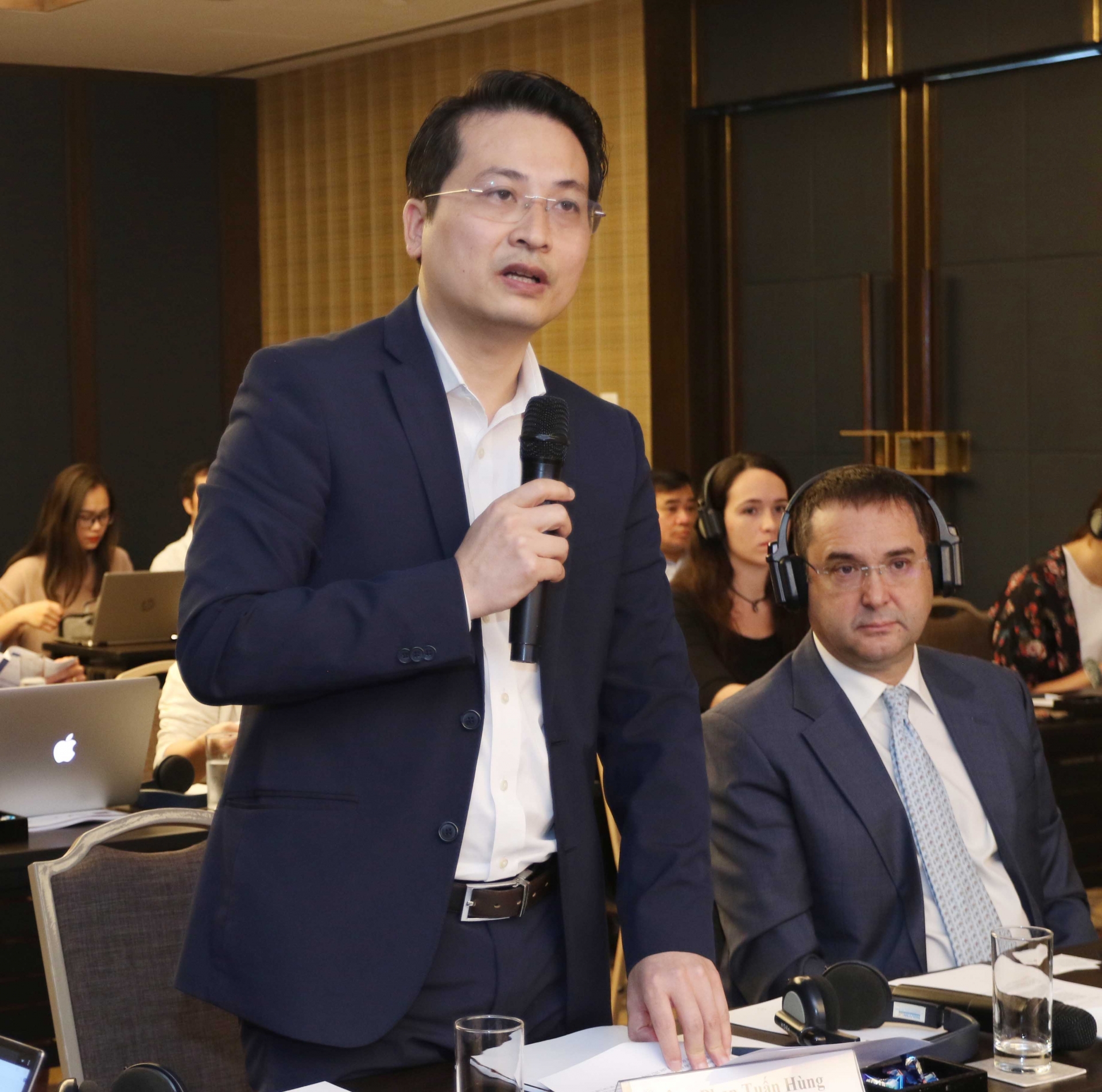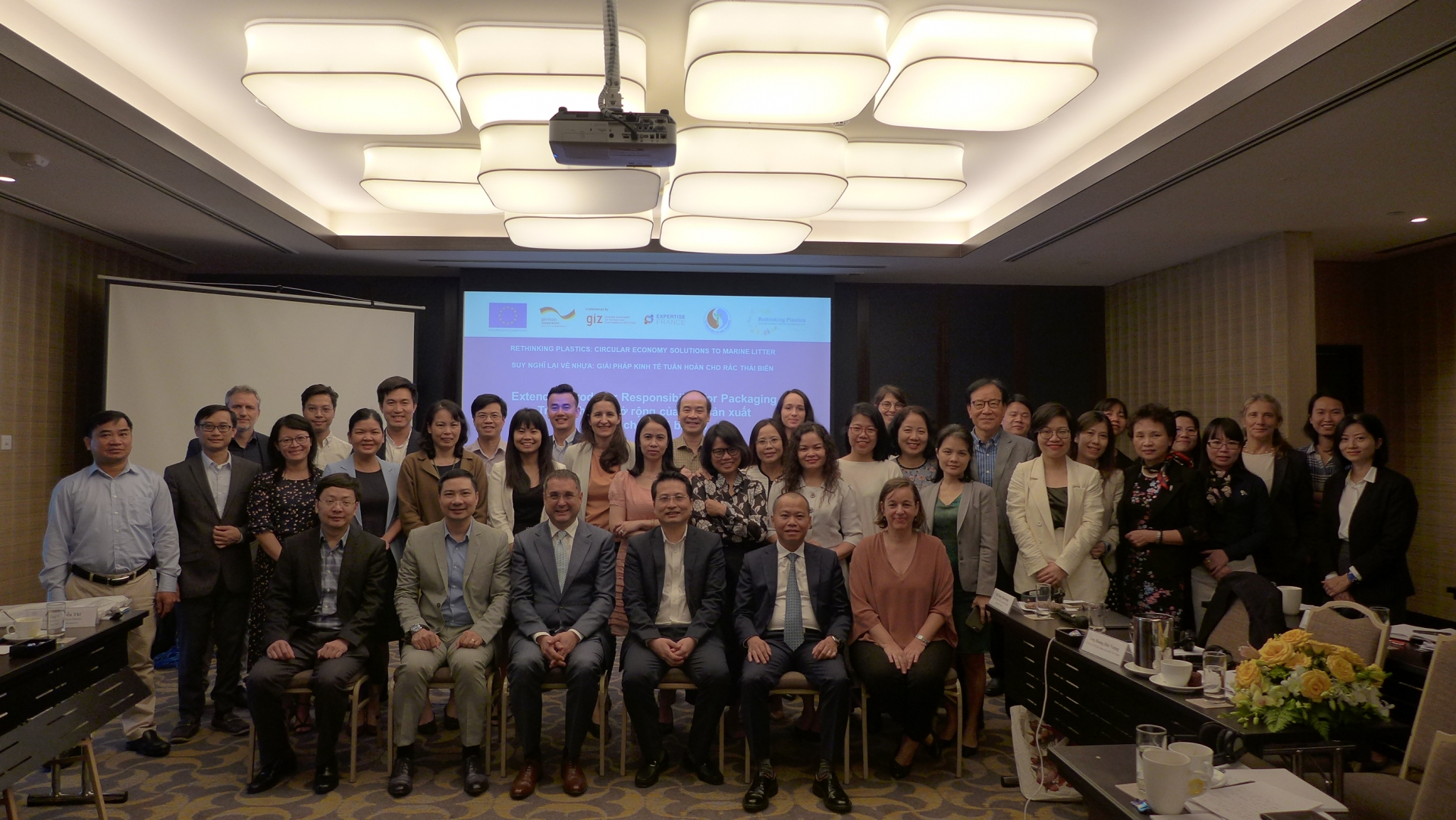EU supports Vietnam in adopting better management of packaging waste
 |
| Rui Ludovino, first counsellor at the Delegation of the EU to Vietnam, shared his thoughts about packaging management in Vietnam |
The information was stressed at a consultation workshop on Extended Producer Responsibility (EPR) for Plastic Packaging co-hosted by the Ministry of Natural Resources and Environment (MoNRE), the EU and Expertise France on January 20 in Ho Chi Minh City. The principle of EPR mechanism is outlined in the revised Law on Environmental Protection (LEP) in Vietnam.
It requires companies to be responsible for recycling used packaging in accordance with the recycling rate and recycling standard set by MoNRE, in equivalent targeted amounts of what they put on the market.
Rui Ludovino, first counsellor of the Delegation of the EU to Vietnam told VIR that, “Plastic pollution is a global issue and affects all countries in the world. The EU is highly committed to sound waste management in our member states. We have been working on this topic for many years. In 2015, the first circular economy action plan was in place. Now, we have the second action plan on the circular economy, which is linked to a comprehensive European Strategy on Plastics in the Circular Economy.”
The plastic pollution around the world is dramatic. It affects the economy, the environment, and people’s health. If the rivers and the ocean are polluted in one country, this has also an impact on other countries. Therefore, this global issue needs international cooperation.
“The EU Plastics Strategy includes actions along different axes. The first one is to make recycling profitable for business. New rules on packaging aim to improve the recyclability of plastics used on the market and increase the demand for recycled plastic content. This will lead us to the second and third axes that is that plastic waste and pollution, particularly in the sea, should be substantially reduced. We need to manage packaging from products in a sustainable way by reducing, reusing, and recycling packaging. We have made efforts to improve waste management, sorting and recycling to create a market for secondary materials. For plastics being recycled and reused, there are a lot of economic gains in terms of materials, environment, and people’s health. With expertise in this field, the EU will work with Vietnam to support the implementation of the EPR policy,” he added.
In particular, this is provided in the framework of the project "Rethinking Plastics – Circular Economy Solutions to Marine Litter", which supports the transition towards a circular economy for plastics in Vietnam and six other countries in East and Southeast Asia to contribute to a significant reduction of marine litter. It is co-funded by the EU and the German Federal Ministry for Economic Cooperation and Development (BMZ) and implemented by the Deutsche Gesellschaft für Internationale Zusammenarbeit (GIZ) and Expertise France.
Besides other activities, "Rethinking Plastics" is supporting a pilot project in Ho Chi Minh City, which was launched in November 2020 to increase the collection, sorting, and recycling of plastic packaging to reduce its environmental leakage. It is implemented jointly by the French National Research Institute for Sustainable Development (IRD) and the Hanoi Architectural University (HAU), who amongst others, work on a guideline to classify and measure plastic packaging collection and recycling in rural and urban areas, improve waste sorting at source, and define best practices.
 |
| Phan Tuan Hung, director of the Legal Affairs Department of the MoNRE, shared the legislative changes to the EPR systems |
According to Phan Tuan Hung, director of the Legal Affairs Department of the MoNRE, Vietnam is exploring international practices with existing EPR systems in Europe and around the world, as well as practical tools and guidelines to implement such EPR mechanisms. Most EPR systems in the world have the obligatory ratio and process of recycling. This is the first time Vietnam sets the specific ratio and process for recycling, which will be applied to six sectors including batteries and accumulators, tires, lubricants, vehicles, and packaging.
“EPR schemes help enhance financial flows and multi-stakeholder partnerships that are important to boost the collection and recycling rates of plastics. We are working closely with key stakeholders, especially the business sectors to identify practical and feasible regulations in drafting the EPR Chapter in the Decree guiding the LEP to achieve the better management of packaging waste in Vietnam,” he said.
Better management of Vietnam’s packaging waste is also in line with a chapter on trade and sustainable development under the EU-Vietnam Free Trade Agreement (EVFTA). In this chapter, the EU and Vietnam commit on both sides to cooperate on environmental issues like climate change response. If Vietnam can improve the management of plastic, it will improve the use of resources and reduce emissions.
Ludovino said that the EU is also enabling research and innovation for new plastics that can be better recycled and reused, as part of the Plastics Strategy. For Vietnam, it is important to identify the current practices to find solutions focusing on Vietnam reality with the involvement of different stakeholders. There is no one-solution fits all countries approach, even in the EU.
“I see a huge potential for a good economic model in Vietnam. Better management of plastic waste provides a lot of gains in terms of economic and environmental aspects, as well as resource efficiency. There is a lot of goodwill and commitment from the Vietnamese authorities, the government, MoNRE, and other ministries and provincial authorities and a lot of interests from the different producers and recyclers,” he said, noting that by adopting sound, efficient, and clean technology and practices, Vietnam can become more attractive to EU investors.
 |
| Group photo of participants at the consultation workshop on EPR for Plastic Packaging |
Representatives of the EPR National Platform – a national multi-stakeholder mechanism established by the MoNRE for exchange, dialogue, and synergy to facilitate the EPR implementation in Vietnam – and other academic associations and international organisations joined the workshop to lay the ground for the next steps for Vietnam’s packaging waste management.
For example, a dedicated handbook will be elaborated by the Rethinking Plastics project together with the EPR National Platform to provide a guiding reference to Vietnamese companies and other stakeholders on packaging waste management aspects.
For more information about the “Rethinking Plastics – Circular Economy solutions to marine litter” project, visit https://beatplasticpollution.eu/rethinking-plastics/
What the stars mean:
★ Poor ★ ★ Promising ★★★ Good ★★★★ Very good ★★★★★ Exceptional
Themes: Climate Change Response
Related Contents
Latest News
More News
- Keppel Land raise plastic waste awareness (July 09, 2022 | 13:45)
- 3Vs for gender-inclusive circular era (July 01, 2022 | 14:33)
- Alliances formed in mission to alter behaviours (July 01, 2022 | 14:19)
- Plastic use drop hinges on consumers (July 01, 2022 | 14:03)
- Mainstreaming circular plastic plans (July 01, 2022 | 13:18)
- Applying popular new methods to combat single-use plastic habit (July 01, 2022 | 10:00)
- Retailers endeavor to promote sustainable consumption patterns (June 24, 2022 | 14:46)
- BAEMIN extends green journey in Vietnam (June 23, 2022 | 14:51)
- Closing event of Rethinking Plastics heralds new age of combatting plastic pollution (June 23, 2022 | 11:53)
- Talkshow Innovative Solutions & Substitutes for Single-use Plastic towards Green Consumption (June 22, 2022 | 20:46)

 Tag:
Tag:



















 Mobile Version
Mobile Version